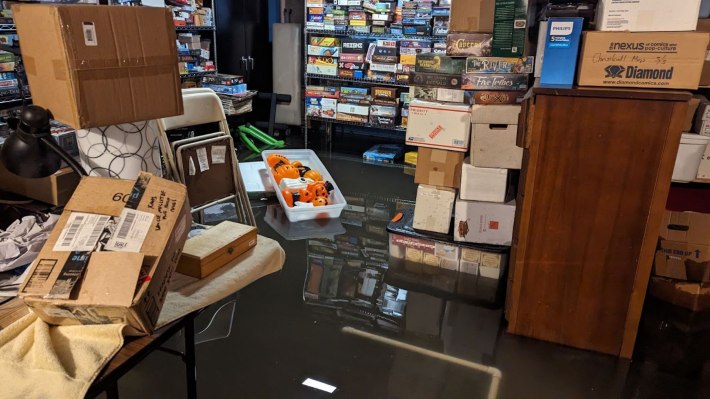CHICAGO Record-breaking rainfall has taken a toll on area waterways, prompting officials to urge Chicagoans, many of whom are still cleaning out basements and replenishing sewage in their homes, to limit water consumption.
According to Metropolitan Water Reclamation District and Department of Water Management officials, Chicagoans can help reduce the amount of water currently overwhelming the system by limiting the use of water-dependent appliances.
Don’t run the dishwasher, don’t wash clothes, shorten toilets and showers, said Allison Fore, a spokeswoman for the remediation district. We want to keep as much water out of the system as possible. When you flush the toilet, that water goes into the same pipes that collect all the rainwater and become overloaded with rain.
Between five and six inches of rain blanketed the city on Sunday, with a 24-hour rainfall total of up to nine inches in the West Side and western suburbs. Flash flood warnings were in place throughout the city for most of the day, and more than a thousand people reported flooding in their homes and businesses.
We were looking at the radar and the storm system was just sitting on the West Side, almost circling it and continuing to dump water, said Ed Staudacher, assistant director of maintenance and operations at Greater Chicago’s Metropolitan Water Reclamation District.
It was simply too much water for the system to handle.
To release some of the excess water, officials reversed the flow of the Chicago River by opening locks so that water could leak into Lake Michigan for a few hours both Sunday and Monday, according to a news release.
The last time officials did this was in May 2020, Staudacher said.
Staudacher said the decision to open the locks is not something officials take lightly because water from the Chicago River pollutes Lake Michigan, which is the city’s source of drinking water. This is necessary in extreme situations, according to the press release.
Officials reverse the river’s flow only when protecting the health and safety of the public from intense flooding outweighs the risks of polluting the waterways, according to Staudacher.
 Credit: Alex V. Hernandez/Block Club Chicago
Credit: Alex V. Hernandez/Block Club ChicagoIf the water in all of the region’s streams continues to rise, it will start flowing into the banks of canals and rivers, Staudacher said. To protect everyone from further flooding, we opened the locks to let the water out into Lake Michigan to relieve the entire system and keep it under control.
The reversal helps regulate the entire 76 miles of streams across the region and prevents further flooding, Staudacher said.
To prevent any damage to public drinking water, water reclamation district officials worked with utility companies to ensure they sourced water from further into the lake from areas that weren’t affected by the reverse flow of the waters. of the river, Staudacher said.
Normally, excess rainwater runs through streams into sewers, then travels through 109 miles of deep tunnels that drop the water into giant underground tanks.
But water from last week’s storms exceeded the system’s capacity and began accumulating in the Chicago River and Calumet-Saganashkee Canal, Staudacher said.
The problem is, our systems aren’t made to channel another nine inches of water in a short period of time, Staudacher said. Once the water system is full, water builds up and pours into the streets, basements and everywhere else.
 Credit: Mack Liedermann/Block Club Chicago
Credit: Mack Liedermann/Block Club ChicagoChicagoans can call 311 to report flooding in their homes and businesses.
The city of Chicago received nearly 1,500 complaints about flooded basements through its 311 online service request map in the days following Sunday’s storm. The complaints focused on the West and Northwest Side neighborhoods of West Garfield Park, Austin, Belmont Cragin and Portage Park.
The Department of Water Management has deployed 122 of its staff to areas hardest hit by the storms on Sunday, a spokesman said.
Staudacher said people should unplug their gutter downpipes so water that runs off their roofs doesn’t run into overwhelmed sewage systems and cause further flooding.
When the sewers are full, the water has nowhere to go except into people’s basements, according to the Chicago 311 website.
Flood water can be contaminated with fecal material from sewage systems, so it’s important to wear protective clothing such as boots, rubber gloves, and long-sleeved shirts when cleanup, according to a flood guide from the Illinois Department of Public Health .
People should wash their hands frequently when dealing with floodwater and avoid eating any food that may have come in contact with the water, according to the guide. Anything that the flood water has touched should be thrown away unless it is possible to thoroughly clean and dry the items completely.
You can find more information on how to approach flood water cleanup here and here.
 Credit: Provided
Credit: ProvidedTo help prevent future flooding, Staudacher said people can use the barrels to collect water and reuse it. Staudacher also recommended that people invest in infrastructure that draws water into the ground, rather than systems that send excess water into overwhelmed sewers.
The Metropolitan Water Reclamation District is working on a project that would expand the region’s overflow tanks so they could eventually hold a total of 17.5 billion gallons of water. This would help prevent sewers from overflowing in the future, Staudacher said.
The region’s treatment system and overflow water storage held about 6 billion gallons of water during storms this week, Staudacher said.
The project is expected to be completed in 2029, according to the districts website.
There’s a lot that can be done, but everyone has to do their part in it, Staudacher said.
Listen to It’s All Good: A Block Club Chicago Podcast:
#citys #water #systems #full #capacity #Chicagoans #urged #people #reduce #water #consumption
Image Source : blockclubchicago.org
